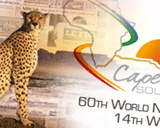 The future for African news groups wishing to develop beyond traditional forms of story telling may lie on the mobile phone.
The future for African news groups wishing to develop beyond traditional forms of story telling may lie on the mobile phone.Peter Feuilherade, media analyst with BBC Monitoring, told a breakfast meeting at World Editors Forum the news diaspora in Africa was such that mobile phones were penetrating where newspapers, TV and the internet had not.
Newspapers are usually dedicated to urban areas and with elites, he said, and the absence of mains electricity had slowed the development of television through the continent.
"Internet usage in Africa still lags behind the rest of the world. With an estimated population of about 915 million people Africa has only some 33 million internet users," he said.
"That's about 3.6 per cent of Africans, who in turn make up one seventh of the worlds population. But the one medium that has really taken off in Africa is the mobile, or cell phone.
"The take-up rate of mobile phones has been spectacular. According to research by Vodafone Africa has been the fastest growing mobile market in the world for the five years to 2005. In Nigeria alone the mobile market is growing at 100 per cent a year.
"This year sub-Saharan Africa had around 88 million mobile users, many of these phones were bought second hand."
In countries where mobiles were cheap and texting popular, he added, the BBC was witnessing growing audience interactivity with its radio programs as listeners contributed to debates.
"People have mobiles who have never had a phone in their home before, and without access to the internet they can feedback to our shows relatively easily by sending texts rather than writing letters, calls or emails," he told Journalism.co.uk later.
Free daily newsletter
If you like our news and feature articles, you can sign up to receive our free daily (Mon-Fri) email newsletter (mobile friendly).
Related articles
- Solutions journalism superstars: Innocent Eteng, managing editor, Prime Progress
- Quartz launches new Africa membership product to monetise investors' interest
- Ethiopian fact-checkers wage an unequal war against Facebook misinformation
- Viral Facts Africa fights covid infodemic with emojis and animated messages
- The Africa Women Journalism Project fosters newsroom innovation during the pandemic









